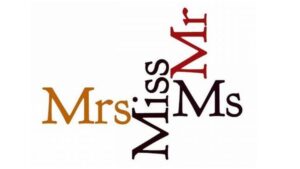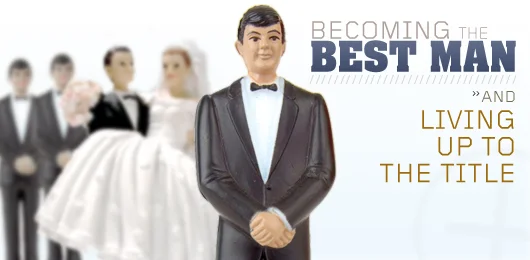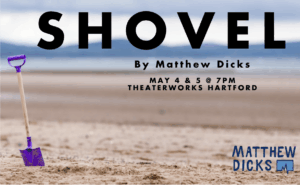If it were up to me, my students would call me by my first name.
I find using last names and titles in education to be an artificial means of respect that doesn’t amount to any respect.
It’s a silly bit of artifice that signifies nothing.
Call me Matt. I’ll earn your respect through consistency, expertise, and love.
However, the use of honorifics makes even less sense for female teachers. It’s nothing more than an inane vestige of the patriarchy.
When a female teacher uses her last name, the honorific is designed to indicate her marital status. Unlike men, who enjoy “Mr.” as their universal honorific, women’s honorific is specifically designed to identify themselves based on their legal relationship to another person—most often a man.
Miss, if you’re unmarried, perhaps have never been married, and maybe are young (whatever that may be).
Mrs. if you’re married.
Ms. if you are older, unmarried, divorced, or choosing to be deliberately vague.
Men need not navigate this nonsense because their age and marital status aren’t relevant. Why?
Patriarchy.
And yes, it’s true. “Ms.” was intended to be the universal honorific for women designed for women regardless of marital status, but it’s also used by unmarried women who feel they are too old for “Miss” but who will ultimately switch to “Mrs.” if they marry, thus muddying the waters of what was meant to be a solution to this problem.
Even when “Ms.” is used exclusively as a universal honorific, the continued existence of the other two female honorifics invariably confuses matters.
Even if a married female teacher chooses “Ms.” to keep her marital status out of her name, she is doomed to a lifetime of slipups from colleagues who know she is married. They will accidentally use “Mrs.” until corrected and likely make the same mistake again.
And for those women who were once “Mrs.” but are no longer married and use “Ms.” the same mistakes will often be made.
I have seen this many times and made these mistakes myself.
Students make these errors even more often and will likely ask about the decision to use “Ms.” over “Mrs.” Thus, despite attempts to use the universal honorific, women will invariably be forced to discuss their marital status anyway, probably more often and in greater detail than if she had used “Mrs.”
The change in last name and honorific when a woman gets married or divorced complicates matters even further.
Ms. becomes Mrs. or vice-versa.
Last names sometimes change, but sometimes don’t.
A woman may be divorced but continues to use her ex-husband’s last name.
I have colleagues who have been married for decades, and yet I still occasionally slip and refer to them by their maiden names.
By the way, the phrase “maiden name” is also fairly archaic and stupid.
Maiden name?
It’s your name. Men don’t have “Maiden” names. I know a man who changed his name when he was married, but he never had a maiden name.
He had a name, and now he has a new name.
A person’s name should not depend on their personal life and legal attachment to a spouse.
It’s that simple.
Many high school teachers also allow students to call them by their first names, and no one seems to mind, so apparently, using an honorific as a sign of respect also has an expiration date, which makes it even more stupid.
It’s respectful from age five through fourteen, but its usefulness apparently diminishes after that.
That also makes no sense. If I were teaching fourteen-year-old kids, they could call me Matt, but because I teach ten- and eleven-year-old students, they cannot because honorifics still possess the magical power of respect for another three or four years?
It’s so dumb, yet it happens all the time. I called many of my high school teachers by their first names, but I don’t even know the first names of any of my elementary or middle school teachers.
Besides, in my 26 years of teaching, I have learned that if you depend on your title to confer even an ounce of respect on your students, you’re in a hell of a lot of trouble.
I’d much prefer the freedom to use whatever name I choose professionally. Unfortunately, asking my students to use my first name is not a realistic option for me. I work in a school where every teacher is identified by their last name and in a district where educators and administrators with doctorates almost always use that honorific.
I have two friends who possess doctorates, yet neither has ever used the honorific in any part of their personal or professional life. I wasn’t even aware that they possessed a doctorate for years.
I admire them for that.
Even if I were allowed to have students use my first name (and I suspect that I am not), I’ve also come to understand the hazards of stepping out of line regarding decades-old, tradition-laden practices in the workplace, especially in a school.
Breaking this norm would be challenging, to say the least. I have colleagues who have never referred to me by my first name after years of working together.
Can you imagine how they might feel if students suddenly called me Matt?
Traditions are difficult to break. It can be done, but you need to be prepared to be despised by many for doing so. I do not feel strongly enough about this issue to absorb that kind of flack.
At least not yet.
However, I allow students to refer to me by my first name when the bell rings on the last day of school, and some do. It’s a hard transition for some, and many can’t manage it, but I’m always grateful to those who can and choose to. When they come back and visit me, they’ll walk into the classroom and say, “Hi, Matt,” which always throws my current students for a loop.
Some teachers, too, I suspect.
It’s my teeny-tiny shout into the wind. My attempt to break tradition long after the breaking would be meaningful.
But if my female colleagues suddenly decided that the patriarchal positioning of their complex collection of honorifics must end today, I would happily join them in their pursuit.
Like my high school colleagues, first names are perfectly acceptable ways to address a human being.
Honorifics are foolish and meaningless ways to signal or garner respect.
First names, I say! Free women from the tyranny of this patriarchal tradition. Toss those honorifics to the trashbin of history and stop children from using marital status and age to dictate name.







